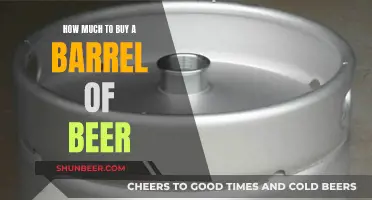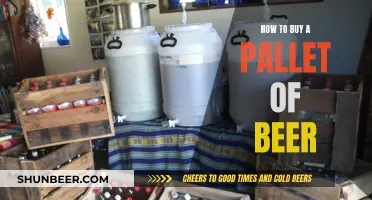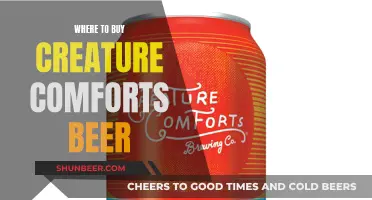
Utah is known for its unique liquor and beer laws, which can be confusing for visitors and residents alike. The state has a thriving craft beer scene, with several local breweries winning awards at national and international competitions. While Utah has strict alcohol laws, it is not a dry state, and alcohol can be purchased and consumed within the state. Beer with an alcohol content of 5% ABV or less is sold in grocery and convenience stores, while wine and spirits can only be purchased from state-run liquor stores, which are closed on Sundays and major holidays. These liquor stores are the only place where wine and spirits can be sold in Utah, and there are around 50 of them across the state.
| Characteristics | Values |
|---|---|
| Alcohol laws | Some of the most restrictive in the US |
| Legal drinking age | 21 |
| Alcohol by volume (ABV) in beer sold at grocery and convenience stores | 5% |
| Alcohol by weight in beer sold at grocery and convenience stores | 4% |
| ABV in beer sold at state liquor stores | 5% or higher |
| ABV in beer sold at clubs and restaurants licensed to sell liquor | 5% or higher |
| Last call for alcohol | 1 am |
| Time bars must close by | 2 am |
| Alcohol by volume in beer | 0.5% or higher |
| DUI limit | 0.05% |
| Number of state liquor stores | 41 |
| Days state liquor stores are closed | Sundays |
| Alcohol by volume in heavy beer | 5% or higher |
| Alcohol by volume in flavoured malt beverages | 5% or higher |
What You'll Learn

Beer with an ABV of 5% or less is sold in grocery and convenience stores
The new legislation allows for beers with 4% alcohol by weight or 5% ABV to be sold in grocery stores and convenience stores. This change has made it much easier for visitors to Utah to purchase and consume alcohol. It's important to note that previously, only beer with an ABV of 3.2% or less could be sold in these stores.
Utah has some of the most restrictive alcohol laws in the United States, and it is one of only 17 control states, meaning the state has a monopoly over the wholesale and/or retailing of alcoholic beverages. Despite this, the new laws have made it more convenient for people to buy beer with a higher ABV without needing to go to a specialised liquor store.
It's worth noting that the sale of alcohol in Utah is still subject to several regulations. For example, alcohol cannot be sold after 1:00 am, and establishments are classified as either restaurants, bars, or clubs, each with its own set of rules regarding alcohol service. Additionally, Utah has the strictest DUI laws in the country, with a blood alcohol limit of 0.05%.
Dollar General Beer Buying Guide: What's Available?
You may want to see also

Bars and restaurants cannot serve drinks to someone who appears intoxicated
Utah has some of the most restrictive alcohol laws in the United States. While alcohol is available for purchase in the state, there are several regulations in place that govern its sale and consumption.
Bars and restaurants in Utah are legally prohibited from serving alcohol to visibly intoxicated individuals. This is part of a broader set of laws aimed at curbing excessive drinking and protecting minors from exposure to alcohol consumption. Other notable laws include the Zion Curtain, which mandated the use of partitions to separate bartenders preparing drinks from customers in restaurants, and the requirement for restaurants to serve food with alcoholic drinks.
Utah's laws regarding the service of alcohol to intoxicated individuals are clear and strictly enforced. Bartenders and servers are responsible for assessing a patron's level of intoxication and refusing to serve them if they appear intoxicated. This assessment is based on behavioural indicators such as slurred speech, unsteady gait, and impaired coordination. Serving alcohol to an intoxicated person is considered a criminal offence, and establishments can face penalties such as fines or the loss of their liquor license if they are found to be in violation.
To ensure compliance with the law, bars and restaurants employ a range of strategies. Many establishments train their staff to recognise the signs of intoxication and refuse service to anyone who appears impaired. They may also implement policies such as limiting the number of drinks served per person, offering non-alcoholic alternatives, or providing free food or water to help slow down alcohol consumption. Additionally, some bars and restaurants may utilise breathalysers or other tools to measure blood alcohol content and determine whether a person is legally intoxicated.
It is important to note that the definition of "intoxicated" may vary depending on local laws and regulations. In Utah, the legal blood alcohol content (BAC) limit for driving is 0.05%, which is lower than the standard limit of 0.08% in most other states. This means that even a small amount of alcohol can put someone over the legal limit in Utah, and bars and restaurants must be vigilant in ensuring they do not serve alcohol to anyone who may be impaired.
In conclusion, bars and restaurants in Utah are legally prohibited from serving alcohol to individuals who appear intoxicated. This law is an important component of the state's overall approach to alcohol regulation and is strictly enforced to ensure the safety and well-being of its residents and visitors. By refusing service to intoxicated individuals, establishments play a crucial role in preventing alcohol-related harm and promoting responsible drinking practices.
Buying Beer in Anderson, SC: What You Need to Know
You may want to see also

Alcohol can be purchased on Sundays in Utah
Utah has strict laws on alcohol, which have been relaxed in recent years. Alcohol can be purchased in licensed restaurants and bars seven days a week. However, there are different rules for different types of establishments. For example, alcoholic drinks can be ordered in a restaurant from 11:30 a.m. to 1 a.m., but they must be ordered with food. In bars and clubs, anyone 21 or older with a valid ID can enter and have a drink, but customers under 21 are not allowed in the bar or lounge areas. Last call for alcohol is generally 1 a.m., and bars must close by 2 a.m.
Taverns, breweries, and bars are allowed to sell alcohol during the same hours as restaurants (11:30 a.m. to 1 a.m.), but they do not require patrons to order food. Drinks of any percentage are available in bottles, and to-go beers of all percentages are offered at some breweries in bottles and cans. No one under 21 is allowed in an establishment licensed as a bar in Utah.
Utah state liquor stores, which sell higher ABV beer, wine, and liquor, are closed on Sundays. However, breweries, wineries, and distilleries can sell their products every day of the week, including Sundays. You can buy to-go bottles from these establishments, but containers must remain closed on the premises.
Grocery and convenience stores also sell beer and similar products like hard seltzers every day of the week, but they are limited to beer with 5% ABV or less.
Wisconsin's Beer Buying Cut-off Time Explained
You may want to see also

The Utah ABV limit is 5%
Utah's alcohol laws are among the most strict and complex in the United States. The state is considered a "control state", meaning it has a monopoly over the wholesale and/or retail distribution of alcoholic beverages. While all 17 control states control the sales of spirits, only six, including Utah, control wine sales. Furthermore, Utah is the only state that remains in full retail control of beer higher than 5% ABV.
Utah's ABV limit for beer sales has changed over time. Prior to November 2019, the legal limit for beer sold in grocery and convenience stores was 3.2% ABV. This was increased to 4% ABV (or 5% alcohol by volume) in 2019, and then to 5% ABV (or 4% alcohol by weight) in November 2019.
In addition to the ABV limit, there are several other restrictions on the sale and consumption of alcohol in Utah. For example, alcohol can only be served in bars and restaurants between 10:00 am and 1:00 am, and last call is at 1:00 am. Alcohol cannot be sold in restaurants without food, except in breweries or beer-only establishments. Drinks must also be purchased one at a time, and pitchers of beer or other alcoholic beverages are not allowed.
Utah also has strict DUI laws, with a blood alcohol content (BAC) limit of 0.05%—the lowest in the country. This means that even one or two drinks could put someone over the legal limit for driving.
Where to Buy Medalla Beer in Texas?
You may want to see also

Utah has some of the strictest DUI laws in the country
The consequences of a DUI conviction in Utah can be severe and life-altering. For a first DUI offence, you may face a mandatory two-day jail term or 48 hours of community service, a potential 180-day prison term, a 120-day license suspension, installation of an Ignition Interlock Device (IID) for a year if your Blood Alcohol Limit (BAC) is 0.16% or more, and fines of at least $1,310. If you are reliant on your vehicle for work, a license suspension can be particularly devastating.
For a second DUI charge in Utah, the punishments become more severe, including a mandatory 10-day jail sentence or 5 days in prison and 30 hours of electronic monitoring, a license revocation for two years, a maximum of 180 days in prison, two years of IID if you have been convicted within the last ten years, and minimum fines of $1,560. A third DUI charge in Utah can result in a mandatory 62-day prison term, a maximum of five years in a penitentiary, license revocation for two years, two years of IID if convicted within the last ten years, and minimum fines of $2,580.
It is important to note that in Utah, you can be arrested for a DUI even if you are not driving the vehicle at the time. Simply being seated in the car, possessing the ignition key, or touching the steering wheel or controls can result in a DUI charge. If you are facing a DUI charge in Utah, it is highly recommended that you seek legal counsel and consult with an experienced Utah DUI attorney.
Alabama's Sunday Beer Buying Hours: When Can You Buy?
You may want to see also
Frequently asked questions
No. You must be 21 or older to buy or consume alcohol in Utah. A valid form of identification is required to prove your age.
Beer with an alcohol content of 5% ABV or less is sold in grocery and convenience stores. Beer with a higher alcohol content must be purchased from state-run liquor stores or from the brewery itself.
State law prohibits consuming liquor in a public building, park, stadium, or public bus unless there is a license or event permit to do so.







